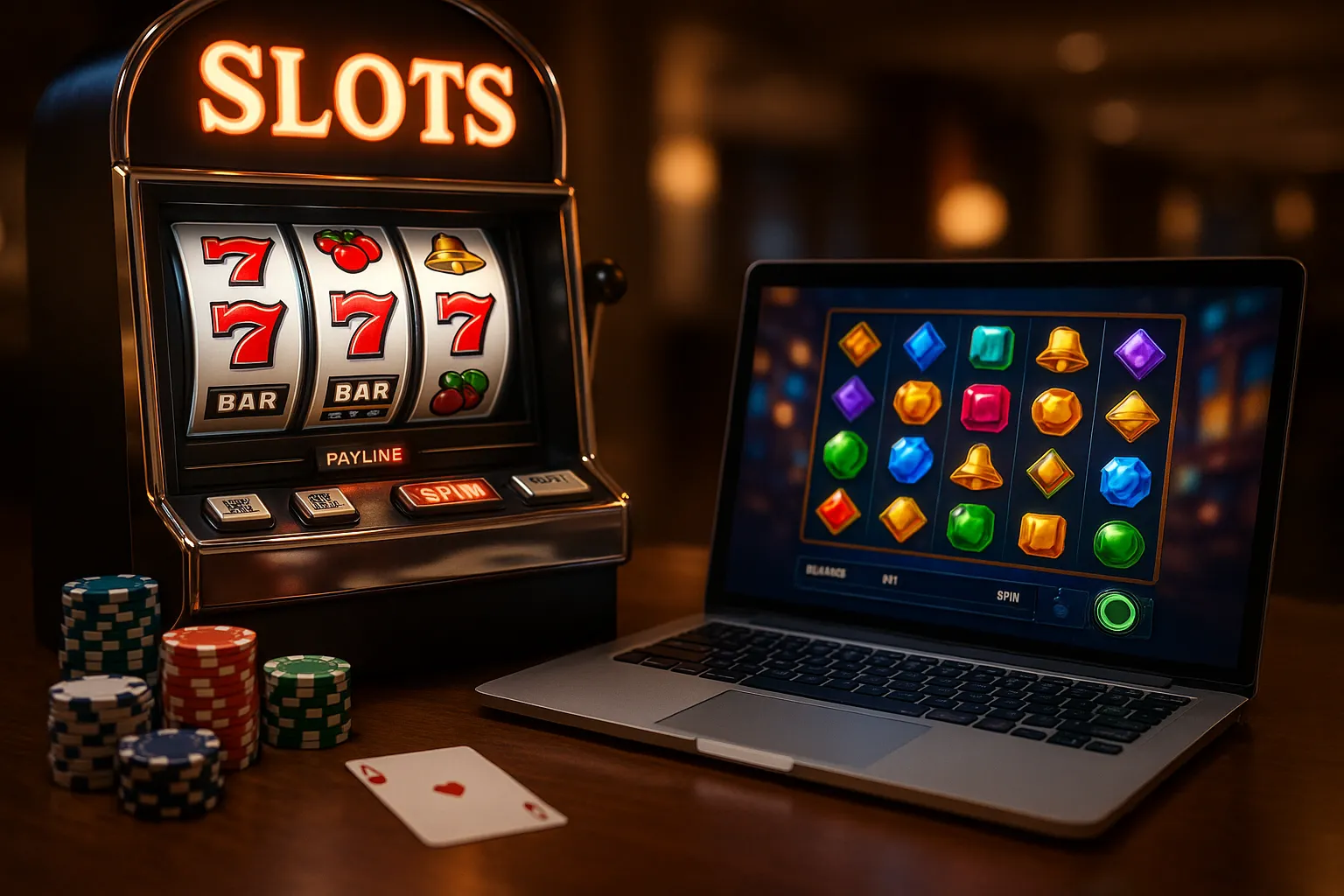I’ve yanked the lever on clunky cabinets in smoky Vegas corners and tapped “spin” on my phone at 2 a.m. while half-watching Netflix. Both sessions delivered that same micro-hit of dopamine when the reels lined up—but they felt wildly different. If you’ve wondered whether there’s more to it than ambience and convenience, let’s dig into how land-based and online slots really diverge in math, regulation, psychology, and player control.
The Core Mechanics Feel Similar—But the Delivery Isn’t
At heart, every modern slot—physical or digital—runs on a Random Number Generator. Land-based cabinets use dedicated hardware; online slots use software RNGs certified by independent labs. You press a button or pull a lever, the RNG picks a result, and the animation just “reveals” it. So why do they feel different? It’s the wrapper: cabinet design, sound profiles, the buzz of a casino floor versus the crisp UI, autoplay, and bonus-buy buttons online. The math is the same class of math—probabilities on reels and weighted symbols—but how often you can trigger features, the speed between spins, and the limits (or lack of them) around your play vary more online.
Regulation, Payout Transparency, and Player Protection
On a casino floor, machines are licensed by local gaming commissions, routinely audited, and physically sealed. You can’t tweak much beyond your bet size. Online, things get flexible fast—thousands of titles, multiple RTP versions of the same game, and features like bonus buys that no land-based cabinet could legally or practically offer. That freedom is a double-edged sword, especially once you step outside UKGC territory. When you explore gambling sites not on GamStop, you’ll see looser sign-up rules, fewer friction points, and sometimes faster bonuses—but also fewer mandatory reality checks, lighter KYC, and occasionally opaque withdrawal policies. The onus shifts from regulator to player: you need to verify licensing, read cash-out caps, and make sure independent audits back the game math. Responsible standards matter, and borrowing the mindset of bodies that preach transparency and accountability helps you stay safe even in freer markets.
Physical Space vs. Infinite Lobby: Choice and Pace
Walk through a brick-and-mortar casino and you’ll notice groups of identical cabinets. Floor space is expensive, so operators pick proven earners. Choice feels big, but it’s curated. Online lobbies? Practically infinite. If you don’t like a slot’s volatility after five spins, you can jump to another developer, theme, or mechanic in seconds. That buffet can either empower you (experiment! compare RTPs!) or overwhelm you, leading to aimless hopping that burns your bankroll faster than a single cabinet ever could. Autoplay and turbo modes accelerate this; you can run through hundreds of spins online in the time it takes a land-based machine to clear its wins animation once.
RTP Versions and “Pick Your Poison” Options
A quirky online reality: the same slot title can have multiple RTP settings (say 96.5%, 94%, 91%). Casinos choose which version to host. You’ll rarely know which you’re on unless it’s displayed in the help menu. Land-based slots also vary by jurisdiction, but you can’t swap venues in a click. Online, you can search for the high-RTP host—if you’re willing to check the info screen each time. Savvy players treat this like bargain hunting; casual players often never notice.
Bonuses, Jackpots, and Feature Density
Land machines lean on physical progressives and communal bonus spectacles: giant overhead meters, chair-rattling animations. Online, studios pile on features—cascades, sticky wilds, buyable free spins—because attention spans are short and competition is fierce. Networked progressives exist in both worlds, but online networks can span hundreds of sites, ballooning jackpots faster. The catch: online sites can gate jackpot eligibility behind max bets or side wagers easier than cabinets can, so reading the rules matters even more at home.
Social Energy vs. Personal Control
There’s a reason some players still pack into casinos: the energy. Cheers from the craps table, the ding-ding chorus, the psychological cue that “something is happening.” That environment can make you play longer—and sometimes better, if social breaks slow you down. Online, you get solitude, speed, and control. Want to set a deposit limit automatically? Most licensed sites let you. Want to binge-spin at warp speed? Also possible. Your mood dictates your risk. Know yourself: if isolation makes you lose track of time, install your own brakes (timers, budget caps, self-exclusion options).
Sensory Design: Tactile vs. Digital Dopamine
A physical spin has weight—the clunk of a button, the resistance of a lever. Designers exploit that tactile feedback. Online, designers exploit UI, color theory, and sound engineering. Subtle vibrations on mobile, full-screen celebrations, and faster feedback loops all keep you engaged. Cascading wins, expanding reels, and coin showers are cheaper to animate online than to build mechanically, so studios go wild. The endgame is identical: keep you in the flow state where you’re neither bored nor anxious.
Bankroll Reality: Denominations, Fees, and Cash-Out Logistics
On a casino floor, you’re feeding bills and getting tickets, then waiting at a cashier or kiosk. It slows you down. Online, deposits are instant—and sometimes so are withdrawals, but not always. Fees, processing times, and weekly caps can sneak up on you. Physical casinos usually pay immediately (minus tax forms). Offshore sites might drip-feed a big win over weeks. I treat online bankrolls like I treat e-commerce: never leave more on a site than you’re comfortable losing, and test withdrawals with small sums before you scale up.
Bonus Buys, Autoplay, and Other Online-Only Tweaks
Bonus buys let you purchase a feature round for a fixed multiple of your stake. It bypasses the grind, but the math doesn’t change—you’re paying fair EV (usually slightly worse) for the privilege of skipping the base game. Land cabinets don’t offer this; regulations and physical design forbid it. Autoplay is another online staple that barely exists on real casino floors (outside of electronic table games). It’s a convenience tool that doubles as a bankroll blender if you’re inattentive. Use it, but set stop conditions (loss, win, bonus hit). Some regulators now limit or ban autoplay for this reason.
RNG Trust: Seeing Is Believing vs. Reading Certificates
With a physical machine, players trust regulators and the “sealed box” concept. Online, trust comes from digital certificates, lab seals (eCOGRA, iTech Labs), and reputation. If you’re on licensed UK or EU sites, you’re generally covered. On lightly regulated platforms, do some homework. Forums, watchdog sites, and independent auditors are your friend. If a site buries RTP data and ignores support tickets, exit before chasing losses.
Community and Content: Streamers, Trackers, and Tools
Online slots birthed an entire ecosystem of streamers and stat-trackers. Watching others play can teach you volatility curves, bonus frequency, and trap mechanics—but it can also skew your sense of probability (streamers cherry-pick highlights). Community spreadsheets, RTP trackers, and Discord alerts (for progressive overlays) don’t exist in quite the same way for land-based play. Use the tools, but remember they report probability, not destiny.
Personal Preference: Why I Still Do Both
I love the ritual of turning casino chips into a ticket, then cash. It grounds the experience. But I also love exploring new mechanics online and finding high-RTP versions of fan-favorite slots. On days when I want atmosphere, I go land-based. When I want control and experimentation, I go online. Knowing the pros and cons lets me pick the setting that suits my mood and bankroll.
Practical Takeaways Before You Spin
Define your goal: ambience and a night out, or pure gameplay and variety?
Check RTP and rules: especially online where versions vary.
Set limits where the platform won’t: timers, budgets, stop-losses.
Vet the casino: licensing, audits, withdrawal policies—doubly important off GamStop.
Remember entertainment value: if you’re not having fun, the “difference” doesn’t matter.
Final Verdict: Same Engine, Different Ride
Land-based and online slots share the same RNG DNA, but everything around that engine shifts how you experience risk and reward. Physical machines slow you down, wrap you in sensory noise, and offer fewer knobs to tweak. Online slots hand you infinite choices, faster spins, and a toolbox of features—plus the responsibility to protect yourself. Neither is inherently better; each excels at a different flavor of fun. Decide what you want from your session, then choose the arena that delivers it—with your wallet and well-being intact.








